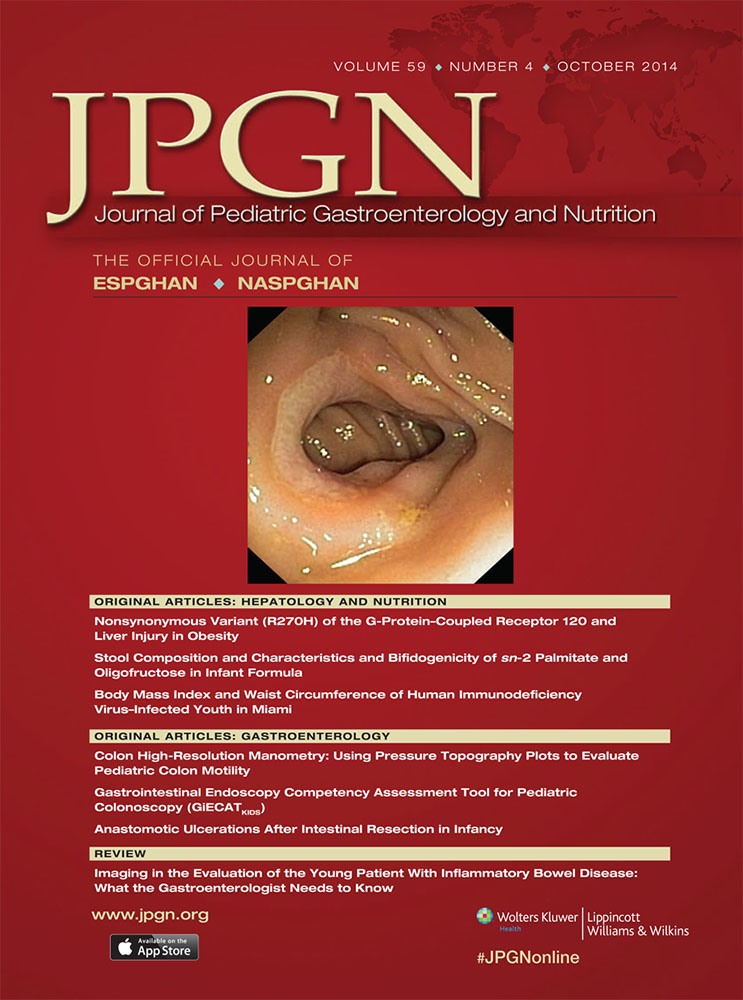Development of the Gastrointestinal Endoscopy Competency Assessment Tool for Pediatric Colonoscopy (GiECATKIDS)
This article has been developed as a Journal CME Activity by NASPGHAN. Visit: http://www.naspghan.org/wmspage.cfm?parm1=742 to view instructions, documentation, and the complete necessary steps to receive CME credit for reading this article.
Supplemental digital content is available for this article. Direct URL citations appear in the printed text, and links to the digital files are provided in the HTML text of this article on the journal's Web site (www.jpgn.org).
The abstract of an earlier version of the present article was presented at the 2011 North American Society for Pediatric Gastroenterology, Hepatology and Nutrition Annual Meeting and the 2013 International Pediatric Simulation Symposium and Workshop.
The project was supported by an American Society of Gastrointestinal Endoscopy Quality in Endoscopic Research Award. C.M.W. is a doctoral fellow of the CIHR Canadian Child Health Clinician Scientist Program. C.M.W. is the recipient of a Department of Paediatrics Research Fellowship (The Hospital for Sick Children) and a Postgraduate Medical Education Award, University of Toronto. H.C. was supported by the BMO Chair in Health Professions Education Research. No funding organization had any role in the design and conduct of the study, collection, management, analysis, and interpretation of the data; preparation, review, or approval of the manuscript; and decision to submit the manuscript for publication.
The authors report no conflict of interest.
ABSTRACT
Objectives:
Many aspects of pediatric colonoscopy differ from adult practice. To date, there is no validated measure of endoscopic competence for use in pediatrics. Using Delphi methodology, we aimed to determine expert consensus regarding items required on a checklist and global rating scale designed to assess the competence of clinicians performing colonoscopy on pediatric patients.
Methods:
A total of 41 North American pediatric endoscopy experts rated potential checklist and global rating items for their importance as indicators of the competence of trainees learning to perform pediatric colonoscopy. Responses were analyzed and re-sent to the panel for further ratings until consensus was reached. Items that ≥80% of experts rated as ≥4 out of 5 were included in the final instrument. Consensus items were compared with those items deemed by adult endoscopy experts as fundamental to assessing the performance of adult colonoscopy.
Results:
Five rounds of surveys were completed with response rates ranging from 76% to 100%. Seventy-five checklist and 38 global rating items were reduced to 18 checklist and 7 global rating items that reached consensus. Three pediatric checklist items differed from those considered to be critical adult indicators, whereas 4 items on the latter did not reach consensus among pediatric experts.
Conclusions:
Delphi methodology allowed for achievement of expert consensus regarding essential items to be included in the Gastrointestinal Endoscopy Competency Assessment Tool for Pediatric Colonoscopy (GiECATKIDS), a measure of endoscopic competence specific to performing pediatric colonoscopy. Key differences in the checklist items, compared with items reaching consensus during a separate adult Delphi process using the same indicators, emphasize the need for a pediatric-specific tool.




